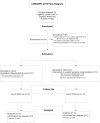A pragmatic cluster randomised controlled trial of a tailored intervention to improve the initial management of suspected encephalitis
- PMID: 30521521
- PMCID: PMC6283633
- DOI: 10.1371/journal.pone.0202257
A pragmatic cluster randomised controlled trial of a tailored intervention to improve the initial management of suspected encephalitis
Abstract
Objective: To determine whether a tailored multifaceted implementation strategy improves the initial management of patients with suspected encephalitis.
Design: Pragmatic two arm cluster randomised controlled trial.
Setting: Hospitals within the United Kingdom.
Participants: Twenty-four hospitals nested within 12 postgraduate deaneries. Patients were identified retrospectively by searching discharge, microbiology, radiology and pharmacy records and included if they met clinical criteria or had a recorded suspicion of encephalitis.
Intervention: An implementation strategy designed to overcome barriers to change, comprising local action planning, education and training, feedback on performance, a lumbar puncture pack and a range of optional components.
Outcomes: The primary outcome was the proportion of patients with suspected encephalitis undergoing diagnostic lumbar puncture within 12 hours of admission and starting aciclovir treatment within six hours. Secondary outcomes included the proportions of adults and children who had a lumbar puncture, who had appropriate cerebrospinal fluid investigations, and who had appropriate radiological imaging within 24 hours of admission. Data were collected from patient records for 12 months before and 12 months during the intervention period, and analysed blind to allocation.
Results: 13 hospitals were randomised to intervention and 11 to control (no intervention), with 266 and 223 patients with suspected encephalitis identified respectively. There was no significant difference in primary outcome between intervention and control hospitals (13.5% and 14.8% respectively, p = 0.619; treatment effect -0.188, 95% confidence interval -0.927 to 0.552), but both had improved compared to pre-intervention (8.5%).
Conclusion: The improvement in both intervention and control arms may reflect overall progress in management of encephalitis through wider awareness and education.
Trial registration: Controlled Trials: ISRCTN06886935.
Conflict of interest statement
BDM is an NIHR Academic Clinical Lecturer and has received support from the BMA and AMS. BDM is a Trustee for the Encephalitis Society and also a member of their Professional Advisory Panel. The results of this study are being disseminated through the Encephalitis Society Annual Members Meeting, the annual Professional Seminar, and in their literature for patients and the public, which bears the Information Standard mark. In addition, TS and RK are members of the Encephalitis Society Professional Panel and RB has previously presented this work during its development to the Encephalitis Society members to seek feedback. This does not alter our adherence to PLOS ONE policies on sharing data and materials.
Figures
References
-
- Michael BD, Sidhu M, Stoeter D, Roberts M, Beeching NJ, Bonington A, et al. Acute central nervous system infections in adults—a retrospective cohort study in the NHS North West region. QJM. 2010;103: 749–58. 10.1093/qjmed/hcq121 - DOI - PubMed
-
- Bell DJ, Suckling R, Rothburn MM, Blanchard T, Stoeter D, Michael B, et al. Management of suspected herpes simplex virus encephalitis in adults in a UK teaching hospital. Clin Med (Northfield Il). Royal College of Physicians; 2009;9: 231–235. 10.7861/clinmedicine.9-3-231 - DOI - PMC - PubMed
-
- Kelly C, Sohal A, Michael BD, Riordan A, Solomon T, Kneen R. Suboptimal management of central nervous system infections in children: a multi-centre retrospective study. BMC Pediatr. BioMed Central Ltd; 2012;12: 145 10.1186/1471-2431-12-145 - DOI - PMC - PubMed
-
- Rao S, Elkon B, Flett KB, Moss AFD, Bernard TJ, Stroud B, et al. Long-Term Outcomes and Risk Factors Associated With Acute Encephalitis in Children. J Pediatric Infect Dis Soc. Oxford University Press; 2015; piv075 10.1093/jpids/piv075 - DOI - PubMed
-
- Kneen R, Jakka S, Mithyantha R, Riordan A, Solomon T. The management of infants and children treated with aciclovir for suspected viral encephalitis. Arch Dis Child. 2010;95: 100–6. 10.1136/adc.2008.144998 - DOI - PubMed
Publication types
MeSH terms
Substances
Grants and funding
LinkOut - more resources
Full Text Sources
Medical
Miscellaneous


